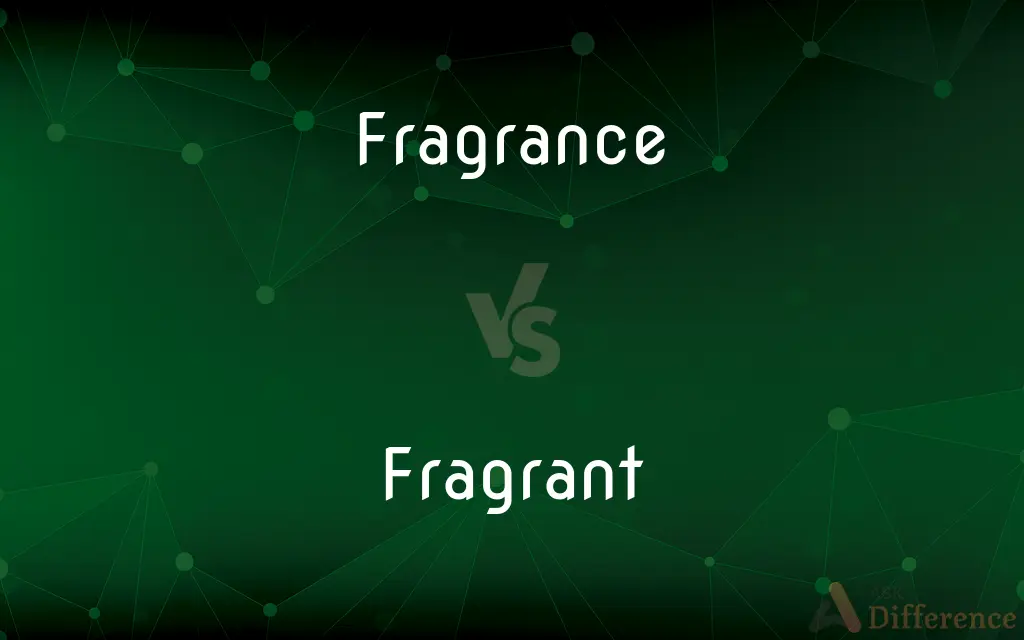Fragrance vs. Fragrant — What's the Difference?
Edited by Tayyaba Rehman — By Fiza Rafique — Updated on March 18, 2024
Fragrance refers to a sweet or pleasant smell, often created artificially, while fragrant describes an object that naturally emits a sweet or pleasant odor.

Difference Between Fragrance and Fragrant
Table of Contents
ADVERTISEMENT
Key Differences
Fragrance is a term commonly used to denote a sweet or pleasant smell, often associated with perfumes or artificially scented products. It encapsulates a wide range of scents designed to evoke specific feelings or memories. On the other hand, fragrant is an adjective describing anything that naturally emits a pleasant smell, such as flowers, herbs, or certain foods. This distinction highlights the source of the scent, whether it is natural or manufactured.
Fragrances are crafted through the combination of various chemical compounds or essential oils to achieve a specific aroma. These are meticulously designed in labs and can mimic natural smells or create entirely new ones. Fragrant items, however, do not require human intervention to release their aroma; their scent is inherent and often varies depending on the environment or stage of growth.
In the realm of consumer products, fragrances are added to a wide array of items including candles, beauty products, and cleaning supplies to enhance their appeal. Whereas, items described as fragrant often rely on their natural aroma to attract consumers, such as in the case of fresh flowers or culinary herbs.
Marketing strategies for products may also differ based on these terms. Products with added fragrances might emphasize the sophistication or allure of their scent, while those described as fragrant might focus on the natural and organic aspects of their aroma, appealing to a different consumer base.
Both fragrance and fragrant play significant roles in cultural and social practices. Fragrances are often used in rituals and ceremonies, carrying symbolic meanings, whereas the natural scent of fragrant objects can evoke a sense of place or season, connecting people to nature and their environment.
ADVERTISEMENT
Comparison Chart
Definition
A sweet or pleasant smell, often artificial.
Describing an object that naturally emits a sweet or pleasant odor.
Source
Artificially created using chemicals or essential oils.
Naturally occurring in flowers, herbs, etc.
Application
Added to products like perfumes, candles, and beauty products.
Inherent in objects, not added. Used to describe natural scents.
Consumer appeal
May emphasize sophistication or specific emotions.
Often highlights natural, organic qualities.
Cultural significance
Used in rituals and ceremonies for symbolic meanings.
Evokes a sense of place or season, connecting to nature.
Compare with Definitions
Fragrance
The quality of being pleasantly odorous.
The room had a gentle fragrance after being freshly cleaned.
Fragrant
Emphasizing the natural, pleasant smell of an environment.
A fragrant meadow in spring attracts many visitors.
Fragrance
A distinctive, often pleasant smell.
The fragrance of her perfume lingered long after she left the room.
Fragrant
Pertaining to substances that emit a natural aroma.
Fragrant herbs are essential in many culinary traditions.
Fragrance
The combination of scents in a perfume.
The fragrance combines notes of rose, jasmine, and sandalwood.
Fragrant
Having a pleasant smell naturally.
The kitchen was fragrant with the aroma of baking bread.
Fragrance
A substance designed to emit a pleasant odor.
She added a few drops of lavender fragrance to the diffuser.
Fragrant
Descriptive of something that smells good.
The fragrant roses became the centerpiece of the garden.
Fragrance
A term used in marketing to describe scented products.
The new fragrance line caters to a youthful demographic.
Fragrant
Used to express the presence of a pleasing odor.
The air was fragrant with the scent of pine trees.
Fragrance
A pleasant, sweet smell
The fragrance of fresh-ground coffee
The bushes fill the air with fragrance
Fragrant
Having a pleasant odor.
Fragrance
The quality of having a pleasant odor
The fragrance of the ocean breeze.
Fragrant
Sweet-smelling; having a pleasant (usually strong) scent or fragrance.
Fragrance
A sweet or pleasant odor; a scent.
Fragrant
Affecting the olfactory nerves agreeably; sweet of smell; odorous; having or emitting an agreeable perfume.
Fragrant the fertile earthAfter soft showers.
Fragrance
A substance, such as a perfume or cologne, designed to emit a pleasant odor.
Fragrant
Pleasant-smelling
Fragrance
A pleasant smell or odour.
Fragrance
(transitive) To apply a fragrance to; to perfume.
Fragrance
The quality of being fragrant; sweetness of smell; a sweet smell; a pleasing odor; perfume.
Eve separate he spies,Veiled in a cloud of fragrance.
The goblet crowned,Breathed aromatic fragrancies around.
Fragrance
A distinctive odor that is pleasant
Fragrance
A pleasingly sweet olfactory property
Common Curiosities
Why do people prefer fragrant products?
People may prefer fragrant products for their natural and potentially health-beneficial qualities, such as aromatherapy effects.
Can a product be both fragrant and have a fragrance?
Yes, a product can be naturally fragrant and also have added fragrances to enhance or complement its natural scent.
What is the main difference between fragrance and fragrant?
Fragrance refers to a sweet or pleasant smell, often artificial, while fragrant describes something that naturally emits a pleasant odor.
How do I know if a scent is natural or a fragrance?
Check the product labeling for terms like "natural aroma" or "essential oils" for natural scents, and "fragrance" or "perfume" for artificial ones.
Are all fragrances artificial?
While many fragrances are artificially created, some can also be derived from natural essential oils or extracts.
Are fragrant plants always safe to smell?
Most fragrant plants are safe to smell, but some can cause allergies or be toxic if ingested.
Is the ability to produce a fragrance common in all flowers?
Not all flowers are fragrant; some are bred for color and form over scent.
Can fragrances be removed from products?
Once added, fragrances cannot easily be removed from products, but unscented versions may be available.
Can fragrances cause allergies?
Yes, artificial fragrances can cause allergies or sensitivities in some individuals.
What is the role of fragrance in marketing?
Fragrance plays a crucial role in marketing by appealing to consumers' emotions and memories, influencing their purchasing decisions.
Do all cultures use fragrance in the same way?
The use of fragrance varies widely across cultures, with different preferences for scents and applications in rituals and daily life.
How can I choose a fragrance that suits me?
Choosing a fragrance involves considering personal preference, the occasions for its use, and how it reacts with your skin chemistry.
Can fragrances be patented?
Yes, specific fragrance formulations can be patented to protect their unique composition.
How are fragrances added to products?
Fragrances are added to products through a careful blending of various scent compounds and oils during the manufacturing process.
What makes a substance fragrant?
Volatile compounds that evaporate at room temperature make a substance fragrant, activating olfactory receptors.
Share Your Discovery

Previous Comparison
Motive vs. Objective
Next Comparison
Ineffective vs. IneffectualAuthor Spotlight
Written by
Fiza RafiqueFiza Rafique is a skilled content writer at AskDifference.com, where she meticulously refines and enhances written pieces. Drawing from her vast editorial expertise, Fiza ensures clarity, accuracy, and precision in every article. Passionate about language, she continually seeks to elevate the quality of content for readers worldwide.
Edited by
Tayyaba RehmanTayyaba Rehman is a distinguished writer, currently serving as a primary contributor to askdifference.com. As a researcher in semantics and etymology, Tayyaba's passion for the complexity of languages and their distinctions has found a perfect home on the platform. Tayyaba delves into the intricacies of language, distinguishing between commonly confused words and phrases, thereby providing clarity for readers worldwide.














































